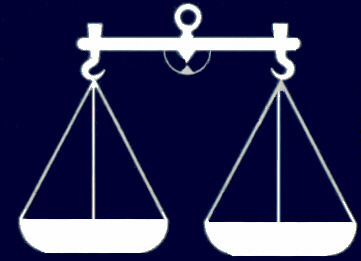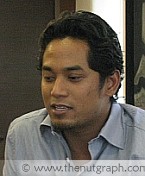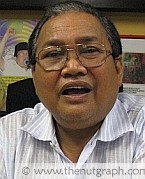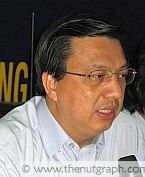 FORMER prime ministers Tun Dr Mahathir Mohamad and Tun Abdullah Ahmad Badawi, and current Prime Minister Datuk Seri Najib Razak, when he was still deputy premier, have all proclaimed Malaysia to be an Islamic state. Despite that, most Umno parliamentarians have avoided answering the question, “Do you think Malaysia should be a secular or an Islamic state? Why?”
FORMER prime ministers Tun Dr Mahathir Mohamad and Tun Abdullah Ahmad Badawi, and current Prime Minister Datuk Seri Najib Razak, when he was still deputy premier, have all proclaimed Malaysia to be an Islamic state. Despite that, most Umno parliamentarians have avoided answering the question, “Do you think Malaysia should be a secular or an Islamic state? Why?”
MCA Members of Parliament (MPs), however, have unequivocally stated that Malaysia is a secular country.
These were some of the observations by Chinese-language news portal Merdeka Review when it analysed Barisan Nasional (BN) MPs’ responses to the MP Watch: Eye on the Parliament project. The Nut Graph project – likely the first of its kind – asks all 222 MPs what their stand is on six key democratic issues.
Among the BN MPs who did not respond was Abdullah Badawi, who has been an MP since 1978. Others who did not reply include Youth and Sports Minister Datuk Ahmad Shabery Cheek (Kemaman), Deputy Home Minister Datuk Abu Seman Yusop (Masjid Tanah), Domestic Trade, Co-operative and Consumerism Minister Datuk Seri Ismail Sabri Yaakob (Bera), Transport Minister Datuk Seri Kong Cho Ha (Lumut), and former minister Datuk Seri Ong Ka Chuan (Tanjung Malim).
When this Merdeka Review analysis was conducted, 109 MPs had responded to the six questions posed in MP Watch. Another 92 had not replied, while the remaining 21 had yet to be contacted. As of 1 July 2010, 58 out of 76 Pakatan Rakyat MPs had replied to MP Watch, while only 46 out of 137 BN reps had done so.
Below is The Nut Graph’s translation of Merdeka Review’s analysis, written by journalist Tan Pek Wan, with some modification. The analysis was published on 14 June 2010.
Umno

Umno Youth chief Khairy Jamaluddin (Rembau), Datuk Bung Moktar Radin (Kinabatangan), Public Accounts Committee chairperson Datuk Seri Azmi Khalid (Padang Besar), and Umno vice-president Datuk Seri Mohd Shafie Apdal (Semporna) did not reply to the question directly.
Khairy said there were Islamic and secular elements within the country’s institutions. “For instance, we practise parallel judicial systems. For non-Muslims, syariah laws generally have little impact on their actions, and they can live by, if you like, ‘secular’ or civil laws. But the same cannot be said for Muslims,” he said.
He added that Islam was constitutionally recognised as the state’s official religion, and that state funds were channelled towards Islam’s development through, for example, the construction of mosques.
“Now, clearly this would not happen if there was complete separation between state and religion. I don’t believe non-Muslims have a quarrel with this fact. Rather, it is Malaysia’s perceived Islamisation that has reignited the debate about whether our country is Islamic or secular,” Khairy said.
Bung Moktar argued that it was unnecessary to declare whether Malaysia was Islamic or secular as the BN had been administering the country in its own way. “There is no point. Of course Islam is the official religion, but we are not an Islamic state,” he said.
Umno information chief Datuk Ahmad Maslan (Pontian) did not express his personal opinion. Instead, he noted that previous prime ministers had described Malaysia as an Islamic state; hence, he would not contradict them.
Besut MP Datuk Dr Abdullah Md Zin, who is also the religious adviser to the prime minister, said Malaysia was an Islamic country, but there were different approaches in implementing an Islamic state. “Malaysia is an Islamic country according to the understanding of the Federal Constitution, and the practice that Malay rulers and the prime minister are Muslims,” he said.
Abdullah Md Zin added that there were different interpretations of an Islamic state: “Some approaches are too extreme, some a little loose, liberal, some are ‘moderate’.”
He said Malaysia adopted the “middle path”: “[N]ot rigid or strict, not extremist yet not too liberal.”

Ibrahim Ali
Perkasa pro-tem president and BN-friendly independent MP Datuk Ibrahim Ali (Pasir Mas) said: “It would be good if Malaysia were to become a full-fledged Islamic state, where all citizens understand the benefits of an Islamic state, including non-Muslims.”
However, he admitted that the time was not ripe yet, and at present, Islam was the federation’s official religion while secular elements were accepted where appropriate.
MCA
Former MCA president Tan Sri Ong Ka Ting (Kulai), current MCA president Datuk Seri Dr Chua Soi Lek’s son Chua Tee Yong (Labis), Datuk Seri Dr Fong Chan Onn (Alor Gajah), MIC treasurer Datuk SK Devamany (Cameron Highlands), and Parti Bersatu Rakyat Sabah president Tan Sri Joseph Kurup (Pensiangan) all considered Malaysia a secular state.
“It is a secular state as was the understanding among [the] founding [leaders] of our country,” said Ong.
Ong’s brief reply was more straightforward than when he was still in office. In April 2008, Kelantan regent Tengku Muhammad Faris Petra said in a keynote speech in a forum that “Malaysia is an Islamic country, not secular.”
Ong’s response then was: “In the early years of independence, our founding leaders inserted the essence of secular law into the Federal Constitution. Hence, the secular nature of the constitution must continue in order to protect the interests of all people.”
MCA Youth chief Datuk Dr Wee Ka Siong (Ayer Hitam) said in MP Watch that “we are a secular state with a Muslim majority.”
Tee Yong said that although Malaysia’s official religion was Islam, Article 11 of the constitution guaranteed the rights of other races to profess and practise their religion. “We have a significant population of non-Muslims — around 40%; thus, Malaysia should be a secular state,” he said.

MCA vice-president Datuk Seri Liow Tiong Lai (Bentong) argued that there was a clear difference between Malaysia and other Islamic states as Malaysia practised a dual court system. The health minister said many people have attempted to label Malaysia as “secular” or “Islamic” for purely political reasons.
“Malaysia’s religious status has never fitted into a concrete definition and there is no reason for us to be forced into one,” he added.
Najib Razak
Najib, who is also Pekan MP, did not respond to The Nut Graph. His deadline was on 14 June 2010. However, on 17 July three years ago, when he was still deputy prime minister, he declared Malaysia to be an Islamic state.
Najib was reported as saying then that “we have never been a secular state. Secular by Western definition means separation of the Islamic principles in the way we govern the country. But we have never abdicated from those principles. Malaysia has always been driven by, and adhere to, the fundamentals of Islam.”
Najib’s statement was disputed by the MCA, the Bar Council, and other civil society groups. Subsequently the Internal Security Ministry, on 19 July 2007, banned all traditional media from publishing any news on the “sensitive” topic. ![]()
Related post: PR shies away from Islamic state issue
The Nut Graph needs your support


Farouq Omaro says
There are many definitions of an Islamic state. A country with a Muslim-majority population like Albania, Kosovo and Turkey are Islamic states though they practise complete separation of state and religion. Then there are countries which are Islamic because their system of governance and their laws are based on Islam such as Brunei, Iran and Saudi Arabia. There are also countries like Malaysia which have a thin Muslim majority but are considered Islamic because of the position given to Islam in the constitution. Other similar countries are Nigeria and Sudan. Then there are countries with Muslim minorities which have been listed as Islamic states because of their alignment with the OIC, like Gabon and Guyana, though this label is not commonly accepted by the countries themselves.
Personally speaking, I do not mind if my country is Islamic. What is important is that universal human rights are not violated. I believe there are many Islamic scholars who agree that Islam and universal human rights are compatible, unfortunately these people are seldom heard!
Dr Syed Alwi says
Dear Farouq Omaro,
There are problems with the Universal Human Rights and mainstream Islamic teachings. In the area of personal freedom and morality, mainstream Islam has rules and regulations that DOES intrude into the realm of an individual’s personal freedom. Sexuality, consumption of alcohol, public indecency etc and so on – are regulated under mainstream Islam. So the kind of absolute freedom as envisaged by the Universal Human Rights – does not quite fit into an Islamic mould. In fact the OIC has been trying to introduce an Islamic version of Human Rights. Islamic Human Rights.
Sean says
“and that state funds were channelled towards Islam’s development”
I had to check KJ’s reply again to see if he really said that. I don’t recall ever being impressed by an honest remark or positive contribution from him before. I wrote and deleted a comment yesterday for your PR version of this article, about how exciting an idea a referendum was. In it, I mentioned that Article 3.1 made no sense to me at all: “Islam is the ‘official religion’; all other religions are officially permitted” – little wonder there’s some confusion!
I think Article 3.1’s meaning (which I consider currently absent) should be made explicit. There’s no need to actually change anything about Malaysia, I just want Article 3.1 to reflect – even to reinforce – Malaysian reality. One of the most glaring examples of where Islam is not like other religions in Malaysia is in government spending. In the light of Article 11.2 and the often-repeated allegation that “Malaysia’s economy is controlled by non-Malays”, there is a yawning gulf between what the Constitution and the Malay proponent says, and what anyone can see if they open both eyes.
If Article 11.2 is being enforced and the Malay proponent is correct, Malaysia should be carpeted in grand Methodist Cathedrals and there should be a National Buddhist Temple dominating the Putrajaya skyline, all paid for from the government purse. Mosques on the other hand, would be consigned to corner rooms in shabby shoplots that would be otherwise vacant. That clearly is not Malaysian reality.
Rather than attempt any radical change, I think some quarrels could be permanently defused if Article 3.1 were updated to include KJ’s suggestion that the ‘official religion’ should receive some national funding before Article 11.2 is applied. Article 11.2 could be amended to say “except for the allowances outlined in Article 3.1.a”. I imagine there are other clarifications that could be added to Article 3.1, but I think the “channeling state funds” amendment should be made a priority to avert any future confusion over the accounts for Article 11.2.
Well done Khairy!
m.k. says
You don’t have to be a rocket-scientist to interpret what is clearly spelled out in our Constitution. UMNO politicians will never admit that Malaysia is a secular state simply because they will lose popularity. That is why they keep avoiding the issue.
Whether Islamic or secular, it will not make any difference so long as non-Muslims are allowed to go about our lives without any interference from religious authorities.
john luther says
There is no Islamic state. There’s only an Islamic regional empire called Khilafa…where all Muslim around the globe unite under one ruler to submit and abide to the rule of Islam 100%. Islam is a unifying religion.
Borneo says
The 20-point agreement, or the 20-point memorandum, is an agreement made between the state of Sabah (then North Borneo) with what would be the federal government of Malaysia prior to the formation of Malaysia in September 16, 1963. A similar agreement was made between the state of Sarawak and the federal government but with certain differences in their 18-point agreement.
Point 1: Religion
While there was no objection to Islam being the national religion of Malaysia there should be no State religion in Borneo (Sarawak & Sabah), and the provisions relating to Islam in the present Constitution of Malaya should not apply to Borneo.
The reason why we are not an Islamic country. Negara Malaysia ini sekular.
Agama rasmi PERSEKUTUAN TANAH MELAYU adalah Islam, tetapi TIDAK ADA AGAMA RASMI DI SABAH DAN SARAWAK. Barangkali MP kita lupa ataupun kita terlupa kerana silibus sejarah yang buat kita terlupa.
Apa pandangan saudara semua?